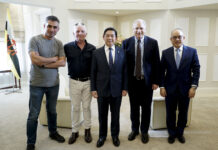
The 2025 Strategic Plan drawn up by Brunei’s Ministry of Transport and Infocommunications (MTIC) aims to leverage technology and connectivity to enhance the lives of the country’s citizens.
Focusing on five clusters – transportation, information and communication technology (ICT), science, technology and innovation – the Ministry is pursuing initiatives designed to boost digitalization across society, government and the economy. “This plan aims to turn the country into a connected, smart nation,” explains the Minister of Transport and Infocommunications Yang Berhormat Pengiran Dato Seri Setia Shamhary Pengiran Dato Paduka Haji Mustapha.
Within these overriding goals, the Minister emphasises three key objectives: safety and security of the transport system and cyber environment, enhancing public well-being through delivery of efficient and reliable services, and fostering sustainable growth to bolster the national economy.
Key initial milestones have already been reached, including the launch of the 5G mobile network, increased broadband speeds nationwide, expanded rural access to broadband and mobile networks, and delivery of the government’s digital information hub – with digital ID and payment gateways slated for completion by year’s end. “These initiatives are pivotal in fortifying and expanding our digital economy.”

An overhaul of public transportation has proved more challenging, as a result of Brunei’s urban development landscape, demographics and lack of high-density population centres. Here, however, the Ministry’s synergies come to the fore, leveraging on technology to unlock new solutions.
The planned implementation of a smart transport management system enables enhanced efficiency and accountability, while targeted support measures such as tiered pricing mechanisms are designed to make transportation attainable to all segments of society.
To these ends, development of a three-tiered system is underway, consisting of a core bus network, shared ride services for areas without coverage and for ‘last mile’ journeys, and traditional taxi services, incorporating e-hailing and other flexible options.
MTIC’s work is also central to Brunei’s foreign direct investment priorities, with ICT and transportation being two of the sectors targeted for growth given Brunei’s significant potential as a logistics hub and gateway to the wider ASEAN market.
Q&A: Minister Of Transport and Infocommunications
Brunei’s strategic location offers a host of opportunities for UAE partners, as close ties between the two nations provide the backdrop for efforts to expand and diversify the economy.

Q: In the wake of the UAE and Brunei Darussalam’s comprehensive community meeting in December 2020, how has collaboration and cooperation between the two nations progressed?
The scope of collaboration encompasses various sectors including maritime cooperation, land transport, logistic zones, port terminals, technology, communication, information and communication technology (ICT) and fintech. These sectors hold significant relevance for both parties. In light of the globalised world, bilateral relations offer a platform for addressing shared challenges.
Closer ties between our two nations, especially in connectivity, present opportunities for mutual benefit. A recent Memorandum of Understanding (MOU), signed in October last year, paves the way for focused collaboration, particularly in cybersecurity.
Transportation is another area ripe for cooperation, exemplified by Royal Brunei’s flights to Dubai. There’s potential to expand these routes, leveraging Dubai’s status as a regional air travel hub. Discussions are underway to explore additional destinations within the region.
Recent engagements, such as the GITEX conference in Dubai, have facilitated knowledge exchange and showcased digital capabilities. Collaboration opportunities extend to government service platforms, drawing insights from systems like the Dubai TAM and Abu Dhabi’s equivalents. This exchange of expertise complements ongoing initiatives, including the revitalisation of Brunei’s GOV.BN platform.
These interactions, reinforced by people-to-people exchanges, underscore the commitment to exploring collaborative opportunities and fostering mutual growth.
Q: Given Brunei’s emphasis on diversification, particularly in the transportation and ICT sectors, what opportunities exist for UAE investors?
To realise our vision, we are seeking capable partners to enhance and develop numerous industries. Notably, our ministry is actively involved in crafting industrial growth roadmaps for the maritime, aviation, and ICT sectors. Transportation stands out as a pivotal sector, with ambitions to establish Brunei as a logistics hub for both air and marine transport.
While the maritime industry roadmap is more mature, with the aviation sector roadmap soon to be published, work is ongoing on the ICT sector roadmap. These initiatives signify our commitment to identifying and capitalising on opportunities for growth and development in these key sectors.
Q: From your ministry’s perspective, how will these roadmaps contribute to boosting foreign direct investment?
Firstly, it is crucial to clarify why we are focusing on these growth areas. These sectors hold untapped potential, which may attract foreign companies and investors.
One challenge we encounter is the perception of Brunei as a small market. However, we are positioning Brunei as a gateway to the broader Brunei Darussalam–Indonesia–Malaysia–Philippines East ASEAN Growth Area (BIMP-EAGA) and ASEAN markets, leveraging our strategic proximity.
Brunei offers several incentives to attract investors, including favorable tax regimes, streamlined policies for business operations, and credible partnerships, including government-linked companies.
Additionally, BEDB facilitates credible proposals and may support initiatives with 100% foreign ownership. The stability of our government is another key factor, often overlooked, but critical for investor confidence. Regarding aviation, we anticipate the release of a report later this year, following formal endorsement. Clear opportunities have already been identified in this sector, signaling potential for growth and development.
Q: What are the strategic imperatives behind the MOU on cybersecurity with the UAE?
Cybersecurity is a multifaceted issue, with human behavior often identified as its weakest link. Beyond individual behavior, cybersecurity also entails combating organized threats through information exchange.
Collaborative efforts, such as those between cybersecurity organizations in Brunei and the UAE, involve sharing intelligence to stay ahead of evolving threats.
Acknowledging that cybersecurity is an ongoing challenge, there’s value in learning from others’ experiences to proactively anticipate and prevent potential breaches. This emphasizes the importance of a willingness to learn and adapt, as cyber threats are becoming increasingly complex and sophisticated. The MOU marks an important step in the right direction for our two nations to work collaboratively in ensuring the overall safety and security of our digital space.
This article is an extract published in Gulf News’ Brunei Business Feature on July 29, 2024.

Brunei Business Feature published in Gulf News, an initiative by BEDB


![[VIDEO] The Airport Economist: Brunei Darussalam](https://www.bizbrunei.com/wp-content/uploads/2025/03/AE_Youtube-Thumbnail-218x150.jpg)


![[VIDEO] The Airport Economist: Brunei Darussalam](https://www.bizbrunei.com/wp-content/uploads/2025/03/AE_Youtube-Thumbnail-100x70.jpg)




